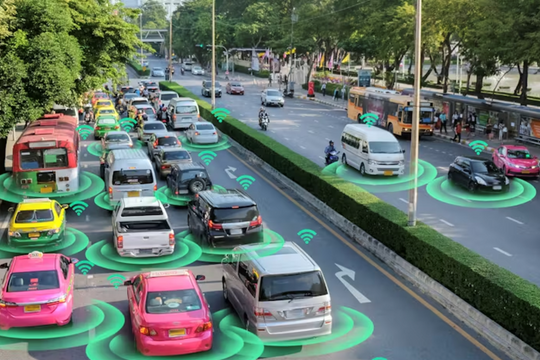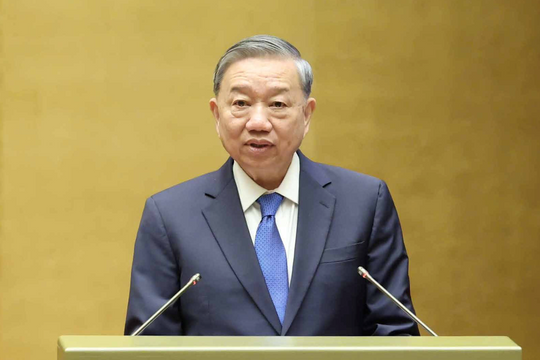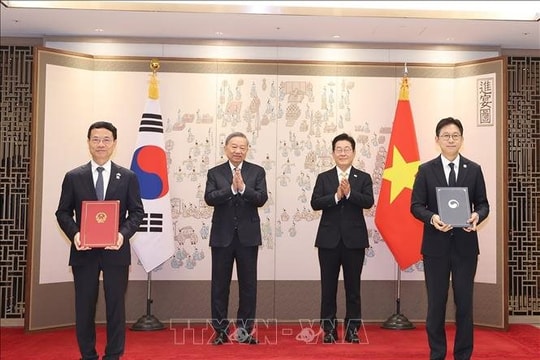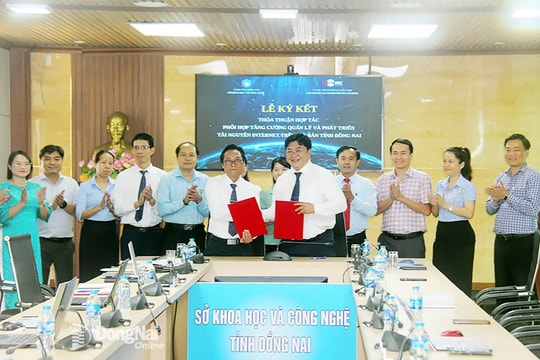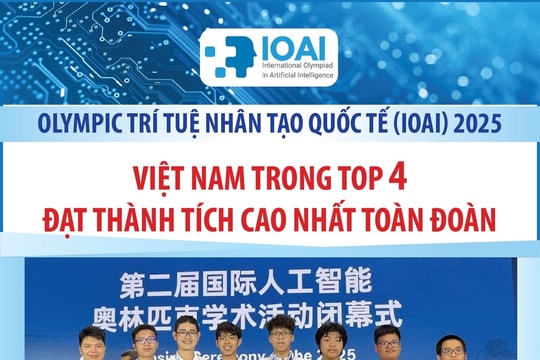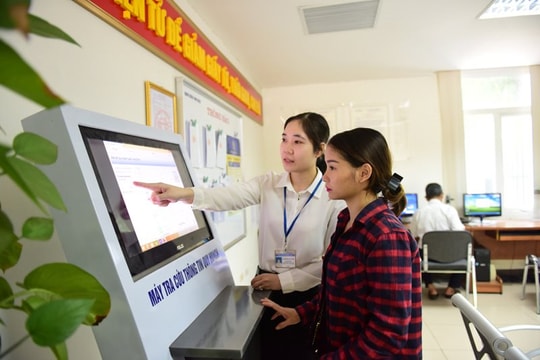THE JOURNEY OF BUILDING A "DIGITAL VIETNAM"
In August 2018, the National E-Government Committee chaired by the Prime Minister was established. On March 7th, 2019, the Government issued Resolution 17/NQ-CP on a number of key tasks and solutions for e-Government development in the period of 2019 - 2020, with a vision to 2025. Then, on March 12th, 2019, the Government approved the National Public Service Portal Project.

Prime Minister Nguyen Xuan Phuc delivered a speech at the launching ceremony of the National Reporting Information System, the Information Center for Governmental and Prime Minister direction and administration, and announcement of the 1,000th public service on the National Public Service Portal.
In particular, on September 27th, 2019, the Politburo issued Resolution No. 52-NQ/TW on a number of intentions and policies to actively participate in the Fourth Industrial Revolution with the general goal of: "effectively grasp opportunities brought about by the Fourth Industrial Revolution for promoting processes of renewed growth model; undertaking economic restructuring associated with strategic breakthroughs and country modernization; developing strongly a digital economy; developing rapidly and sustainably by pursuing science and technology-based development, promotion of innovation and high-quality human resources; improving the quality of life and well-being of the people; ensuring firmly national defense and security and protect the ecological environment". Next, on June 3rd, 2020, the Prime Minister approved the "National Digital Transformation Program to 2025, with a vision to 2030".
Thanks to the participation of the whole political system, according to the statistics of the Ministry of Information and Communications, after 1 year of e-Government implementation, there have been positive changes in the use of electronic documents among state agencies. 100% of ministries, agencies and localities have been interconnected. They also sent and received electronic documents through national e-document exchange platform. The rate of electronic documents exchanged over the network increased from 72% in 2018 to 86.5% in 2019. The rate of ministries, ministerial-level agencies, governmental agencies, cities, and provinces as well as centrally run cities and provinces with integrated platform, and data sharing increased from 3% in 2018 to 27% in 2019.
Regarding the e-Government construction, according to the Prime Minister's assessment, the building and improvement of the institution to build and develop e-Government has been strengthened. Platforms for e-Government development have been deployed very quickly, including a platform for integrating and sharing national data with data integration
and sharing platforms from ministries, agencies, and local governments. Information security systems have all been drastically improved, preventing information disclosure, leakage, and theft. Many local governments have delivered 100% of online public services at level 4, creating favorable conditions for people and businesses.
These results also confirm the determination of the Government and the Prime Minister in building a "digital Vietnam". At the opening ceremony of the National Information Center, Prime Minister Nguyen Xuan Phuc stated that, building and developing a digital government is an inevitable trend. It serves to improve the openness and transparency of the Government and pushes back corruption and waste; contributing to promotion of economic growth; improving the business environment, competitiveness, productivity, and is the right way to develop a strong and prosperous Vietnam. Therefore, we need to continue to strongly affirm that 2020 is the year of national digital transformation. It is also the year that kicks off the process towards a "digital Vietnam".
MINISTRY OF INFORMATION AND COMMUNICATIONS AND THE "CONDUCTOR" ROLE
Together with the Government, the Ministry of Information and Communications plays a key role in leading and promoting e-Government implementation in Viet Nam. At the meeting of the National e-Government Committee with the e-Government Steering Committees of ministries, sectors and localities, Minister of Information and Communications Nguyen Manh Hung emphasized: "Our vision of e-Government is to digitize public services, towards digital government, digital economy and a comprehensive digital society, which is always people-centric. An e-Government strategy is to provide level 4 online public information and services to all people, anytime, anywhere. It is also the art of making the Government more transparent to prevent corruption, changing the way government interacts with people and businesses is very much needed. The use of digital technology also allows people in remote areas to access public services, so no one will be left behind. New technologies such as AI, Big data, IoT, mobile, etc. are all used to accelerate the digitization of Government. It helps people and businesses to participate more actively in the decision-making process of the Government, social governance, governmental administration in accordance with international standards".
According to the Minister, building e-Government must comply with a number of principles such as: interoperability; network safety and security; scalability over time; no overlapping or duplication; and access to services for everyone.
The challenges of e-Government originated from changing working habits or changing the way of operating and processes, so a technology-oriented thinking will not be the answer. Therefore, the first thing is to change the habits, and the processes. But people do not want this because they have to learn and understand the expertise and processes of other business units.
Also, according to Mr. Nguyen Manh Hung, if you ask others to change their own processes in order to build e-Government, it will be difficult because they are so used to it. Therefore, each province should have a pioneering agency in implementation, which should be the Department of Information and Communications. The Ministry of Information and Communications and the Departments of Information and Communications have to take on the role of a conductor, to solve the difficulties of organizations in implementing e-Government. Department of Information and Communications will have to assume a pioneering role, leading and learning the business expertise of other departments, thereby knowing what needs to be changed to implement e-Government.
MILESTONES IN BUILDING E-GOVERNMENT IN VIETNAM
With such a drastic participation of the Government and the Ministry of Information and Communications, Vietnam has achieved a number of milestones in building e-Government.
The rate of people using level 4 online public services has been more than doubled, from 5.5% in 2018 to 10.76% in 2019. Online public services in some areas are highly efficient such as Taxes (99,8% of businesses make electronic tax filing), Customs (99.7% of businesses implement electronic customs), Treasury (80% of budget-using units transact at state treasuries of provinces, districts, towns, and communes); Business registration (75% of users register a business online), etc.
The National document exchange bus connects 95/95 ministries, agencies, localities, and the Party Central Office; sending and receiving electronic documents at 2 levels of government. Up to now, millions of electronic documents have been sent and received via the National e-Document Exchange Platform.
According to the report of the Government Office, after more than 8 months of operation, so far, the National Public Service Portal has been connected with 18 ministries, and agencies, 63 provinces, and cities and 8 banks, payment intermediaries, and e-wallet service providers. The portal integrates and provides more than 1,000 online public services with over 60 million hits, more than 235,000 registered accounts; over 15 million profiles with status synchronized, more than 295,000 online profiles on the Portal. It also receives and supports over 24,000 calls and 7,800 comments and recommendations. In March 2020, the online payment system of the National Public Service Portal was put into operation. Up to now, there have been 9,000 transactions. In August 2020 alone, there were over 3 thousand transactions with the amount of about VND 5 billion.
"Our vision of e-government is to public services, towards digital government, digital economy and a comprehensive digital society, which is always people-centric. An e-Government strategy is to provide level 4 online public information and services to all people, anytime, anywhere. It is also the art of making the Government more transparent to prevent corruption, changing the way government interacts with people and businesses is very much needed. The use of digital technology also allows people in remote areas to access public services, so no one will be left behind.
New technologies such as AI, Big data, IoT, mobile, etc. are all used to accelerate the digitization of Government. It helps people and businesses to participate more actively in the decision-making process of the Government, social governance, governmental administration in accordance with international standards".
Minister of Information and Communications
Nguyen Manh Hung
Recently, in August 2020, the Government inaugurated the National Reporting Information System, the Information Center for Governmental and the Prime Minister direction and administration, marking a new milestone in building e-Government in Viet Nam. The reporting information systems of 30 ministries, agencies, localities, and groups have been connected and integrated in terms of information and data with the National Reporting Information System. At the same time, 101/200 periodical and socio-economic statistical reporting parameters have been connected and provided on the System by ministries and agencies. 7 information categories have been initially developed. There have been 25 real-time online connections with lots of directional and administration information to better serve the advisory, direction and administration of the Government and the Prime Minister.
The National Reporting Information System is formed on the basis of the Governmental Reporting Information System connected to the Reporting Information Systems of ministries and localities, serving the collection, integration and sharing of report data of administrative agencies; synthesizing and analyzing data to serve the direction and administration of the Government, the Prime Minister, State administrative agencies at all levels. It also supports decision making of leaders based on digital information and data which is displayed visually. It allows monitoring and supervision of the implementation of the socio-economic development goals assigned by the National Assembly.
The above results are due to the drastic direction of the head of the Government, the pioneering leadership of the Ministry of Information and Communications, the responsible participation of leading technology corporations in Viet Nam such as VNPT, Viettel, and FPT. These initial results will be the momentum for Viet Nam to continue to build and assert its pioneering position in the region and the world in building a modern digital government.


